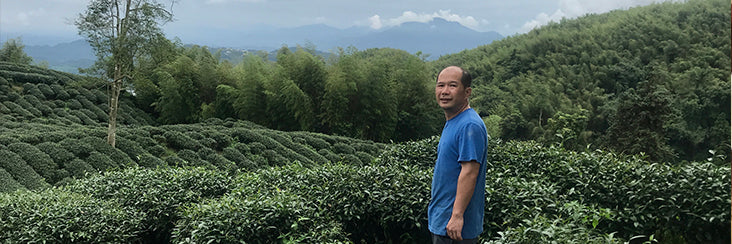
Traditional Lugu Oolong Tea | Eco-Cha Tea Club
 When we rode up in Mr. Zhang's 4WD truck to check out the farm, we had to park here, at this fallen tree, and walk the remaining short distance to his tea farm. This is just one of the many unexpected challenges farmers simply must deal with! Luckily the timing of the tree fall was post-harvest, so it was not preventing any urgent work on the farm.
When we rode up in Mr. Zhang's 4WD truck to check out the farm, we had to park here, at this fallen tree, and walk the remaining short distance to his tea farm. This is just one of the many unexpected challenges farmers simply must deal with! Luckily the timing of the tree fall was post-harvest, so it was not preventing any urgent work on the farm.
He was the first to plant a plot of tea on this mountainside 20 years ago, on land owned by his uncle. This required applying for an access road to be built by the local government. There are now two neighboring plots of tea on this relatively flat, farm-friendly slope.

We learned about this farm from our favorite street food vendor who sets up every evening in front of the Zhushan Farmers' Association to sell "lu wei". Literally translating as "stewed flavor", it's a common night time snack which includes an assortment of fresh vegetables and other prepared food items that customers come and pick and choose for themselves. Then the chosen items are immersed for several minutes in a boiling broth that is unique to each vendor. This vendor boasts self-grown veggies, and the broth is lighter flavored than most. After dozens of chats over the last few years with the friendly vendor, we learned that her husband is a tea maker — born and raised in Lugu.

Mr. Zhang's father cultivated tea on their homesteaded land in Xiaobantian, on the southside of Lugu Township, where he grew up in the midst of traditional tea making. At 20 something, he decided to embody his local tradition by clearing land to cultivate his own plot of tea. For the last 20 years, he has managed his own humble, privately owned plot of tea. Throughout this period, he also acquired seasonal work in tea factories in Lugu, Shanlinxi, Alishan, Fanzaitian, and Lishan. In a word, he learned the ropes of tea making in a comprehensive way, like most tea farmers of his generation. Lugu hosts the highest concentration of tea makers in Taiwan, and is a hub of specialty tea making culture.

Above is the view from the farm, overlooking Xiaobantian in the foreground and downtown Lugu beyond. This farm is at the foot of Dalunshan (Big Wheel Mountain), which is the beginning of the Shanlinxi High Mountain Tea growing region. Mr. Zhang employs relatively sustainable farm management, with minimal fertilization and pest control. This allows his tea trees to be more self-sufficient, even though it compromises the volume of his seasonal yield. He is committed to keeping it simple by investing less in farm products, and accepting the lower volume of produce. He believes that this has resulted in his trees producing leaves with more constituents, which make better quality tea.

We are excited to meet another farmer in the heart of Oolong Tea Country that is a modest legacy to the local culture he was born and raised in. We'll be sure to show up in his home when the next harvest happens to see his simple operation in action. There are only a handful of factories like his left, with no climate control or mechanized shelving to make the job easier. It's the hard work and skill that make a traditionally made Oolong Tea stand apart. And this is one fine example!
LET US KNOW !
What did you think of this article? Have any questions? What's your favorite type of high mountain tea? We really want to know what you think! Leave any thoughts or questions in the comment section below!
SUBSCRIBE!
If you enjoyed this post and would like to hear more about the specialty tea industry here in Taiwan, follow us on YouTube, Facebook, and Instagram and please subscribe to our newsletter. Subscribe now and get $5 off your first order!

